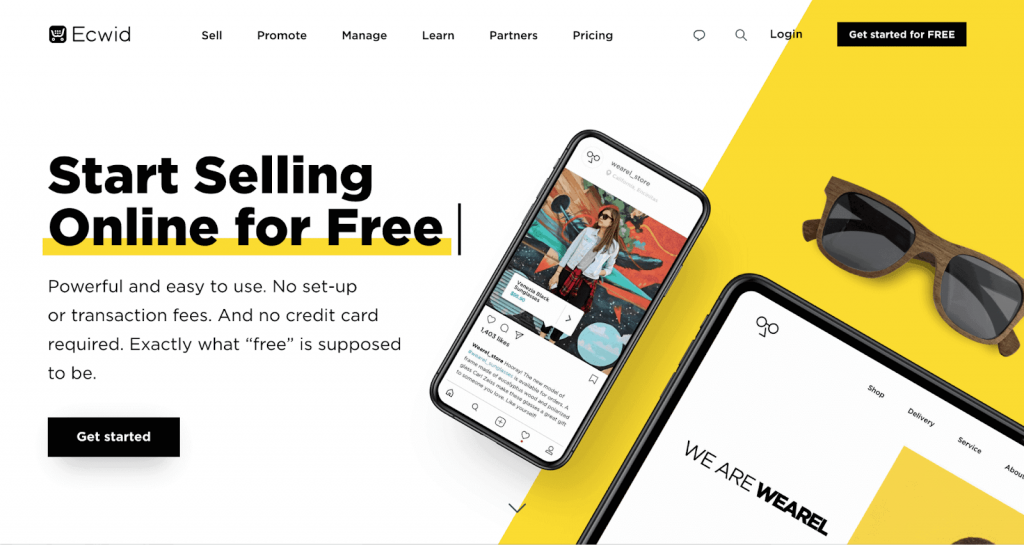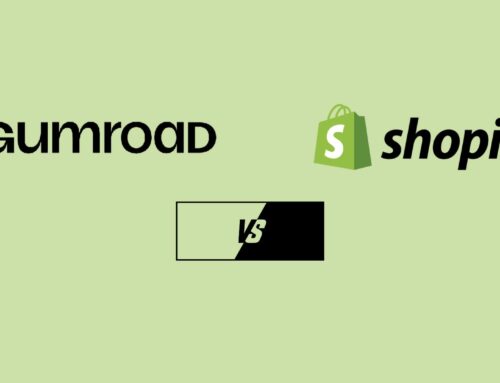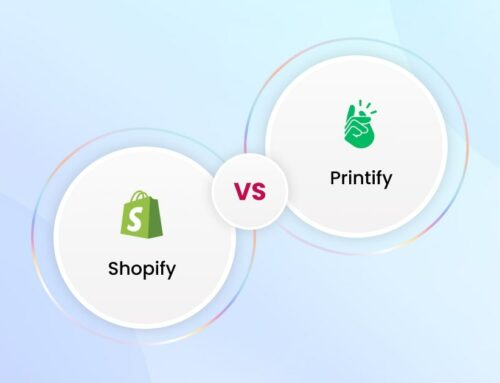Shopify is one of the most powerful e-commerce platforms today with nearly 11% market share in the industry. Ecwid a latecomer, so when comparing Shopify vs Ecwid, Is it possible that a later entrance is a winner? Let’s go into detail about the strengths and weaknesses of each platform and come up with the final verdict on this question.
Contents
- 1 A Quick Overview of Shopify vs Ecwid
- 2 Shopify vs Ecwid Similarities & Differences
- 3 Shopify vs Ecwid: Salient Features
- 4 Shopify vs Ecwid Design options
- 5 Payment Process
- 6 Abandoned cart saving
- 7 Apps for Shopify vs Ecwid
- 8 SEO features between Shopify vs Ecwid
- 9 Customer Support
- 10 Shopify vs Ecwid: Plans and Pricing
- 11 Conclusion
A Quick Overview of Shopify vs Ecwid
Shopify

Shopify is a platform that helps you build an online store for e-commerce businesses. It includes a fully functional website on the domain you choose. In short, Shopify will allow users to build a complete website from start to finish.
Since Shopify is a SaaS tool (software as a service), you don’t pay a single payment for it. Instead, you pay a monthly fee for the plan in which you choose to use the tool.
As a solid and proven tool, Shopify is suitable for all business sizes, from beginners to large enterprises. Shopify offers a variety of plans to suit each type of business, including useful features and effective sales and marketing strategies. This helps your online store increase the number of customers as well as sales without too much technical or overwhelming.
Ecwid

Ecwid, on the other hand, is not a software or a website builder, it is a store plugin. Ecwid gives you the ability to turn any available website into an e-commerce website. Besides, the platform also provides personalized metrics and product research to increase the KPI of your store.
Hence, the name “Ecwid” is an abbreviation of “e-commerce widget”.
Ecwid is suitable for most business sizes. For small and medium businesses, the Ecwid is an affordable option with a full set of essential features. Besides, it also helps your business grow faster with marketing strategies, sales, and a variety of other gadgets.
Shopify vs Ecwid Similarities & Differences
The similarities between Shopify and Ecwid:
- Offer extensive features
- Mobile friendly
- Offer a range of support options
- Provide easy-to-use and well-designed interfaces.
- There are plans available at different prices and features.
- There are drop shipping options for both Shopify and Ecwid
- Allow the installation of the integration with the software.
- Provide SEO optimization solutions.
- Allow selling digital products
- Provide users with drag and drop experience
- Have integration with POS
The differences between Shopify and Ecwid:
| Shopify | Ecwid |
|---|---|
| – There is no free plan (Only offer a free trial for 14 days) | – Available for a free plan |
| – Fully hosted with no maintenance costs | – Store plugin |
| – Offer basic and enhanced design customization | – Only offer for basic edit of your storefront |
| – Shopify applies a transaction fee if you don’t use its built-in payment gateway | – There are no charges for using a third-party payment gateway |
| – Abandoned cart saving functionality is available on all plans | – Abandoned cart saving functionality is only available on a $35 plan or more |
| – An unlimited number of products on any plan | – The unlimited plan ($99 monthly) offers unlimited product support |
| – Limit product options | -Unlimited product options |
Shopify vs Ecwid: Which one is easier to use?
One of the main reasons that people will pay more than $20 a month to host a website is that Shopify and Ecwid were developed to optimize the user experience. This means that almost anyone with some basic Internet skills can build a functional e-commerce website quickly – no coding required.
Hence, the importance of how easy their system is cannot be underestimated. Both of these platforms provide users with a drag and drop experience. The premise is simple – on the one hand, you have a navigation bar with tools and on the other, a canvas to work with. Additionally, both platforms have applications for phones, helping to optimize the user experience on the phone. You can manage your store anywhere on your phone.
However, there is only one point that Ecwid outperforms Shopify in this section, which is flexibility in image management. Shopify requires you to upload the same size for all images while Ecwid allows you to use images with a global ratio. This helps Ecwid score points in saving users time and effort.

In short, both of these platforms are very easy to use, it is difficult to choose which one is easier to use.
Shopify vs Ecwid: Salient Features
Because Shopify and Ecwid have many of the same outstanding features, below is a detailed comparison of those features between the two platforms. This will let you know between the same features, which platform is better.
Product Management
Add and Manage Products
Product management is an integral part of e-commerce platforms and without exception, both Shopify and Ecwid have very capable systems.
In Shopify’s case, the product pages are linear, which means any options you can modify about them are on a continuous page. Of course, this is divided into logical segments like the product detail, inventory, price, shipping, and more. Also, Shopify allows you to add products to your collection manually and automatically suggest related products to the product you supply.
For the Ecwid, the product pages are divided into tabs with each tab handling a separate field. Some tabs can be mentioned such as Properties and Files. The former is for vendor management, the latter handles digital products. Although there is no “smart collection” feature like Shopify, Ecwid does let you use filters to help speed up category assignment.
Product Limits
There’s no doubt that Shopify is more generous in terms of the amount of products you can host in your store. Shopify offers unlimited product support in all plans.
Meanwhile, you have to use the Unlimited plan of Ecwid to get unlimited products. Other plans of Ecwid include: free plan, you are limited to 10 products; With the venture plan you must spend $15 per month and get 100 products, finally the business plan ($35 per month) supports you with 2500 products.
Product Options
With Shopify, you are limited to just three product options per product. However, you can go to the Shopify app store and buy extensions to remove restrictions or combine two options into one,…but it’s still better if the built-in options aren’t limited from the beginning.

Ecwid, by contrast, is much more straightforward in this regard and doesn’t limit product options at all. Besides, with paid plans, Ecwid allows you to add a simple text box or an “upload file” button to your product to support any additional needs to complete the order.
Support for Digital Products
Both platforms allow you to sell digital goods like music, videos, and more.
To manage this, you need to use a free app called “Digital Downloads” on Shopify and it limits you to the digital product size of 5GB. You can use other plug-ins in conjunction with your Shopify store to increase this, but you’ll usually need to pay extra for them. While, Ecwid allows you to process digital products natively and more widely with file size, allowing up to 25GB.

POS
If you have both a physical store and a digital store, having an integrated system can be invaluable for the business. And both Shopify and Ecwid have this feature built-in, but they function differently.
Shopify offers a ton of POS-related functionality, and even their Shopify Basic plan can use their POS feature. The feature allows you to sell from any location and even integrates a card reader to accept payments.
Inventory and orders are streamlined, although the Basic package lacks advanced features like dedicated Shopify POS hardware support. However, you can seamlessly sell from a group of products and track your inventory accurately.

Now, Shopify has upgraded this feature and harnessed its full potential, you have to pay $89 per month to get the “Shopify POS Pro” add-on. Its features include:
- Unlimited number of POS staff
- Offer “buy online, collect in-store”
- Facilitate exchanges
- Provide receipt customization
- Attribute sales to individual staff
With Ecwid, you need to install third-party services to get POS functionality like Square, Clover, Vend or PayPal. The type of POS hardware you can use such as a card reader, barcode scanner,… will depend on the provider and the country in which you live.
Shopify vs Ecwid Design options
Shopify
Shopify uses Liquid, an open-source template language in Ruby, to create their themes and allows you to make design customizations from basic to advanced (from layouts to color choice). However, advanced customization will require some programming knowledge.
In addition to allowing you to customize existing templates, Shopify also allows you to create new templates for your store. An extensive cheat sheet list is provided for those looking to build Shopify themes from scratch.

Ecwid
Ecwid was originally built as a plugin to be integrated into a ready website, its design approach is somewhat different from standard e-commerce website builders. The following services often offer pre-designed sample collections that can be either free or paid.
Ecwid has a common theme for users who intend to build a standalone website. This design, known as a Starter Website, is quite simple and doesn’t offer deep customization options. It can suit different business needs and styles. The template editing lets you add text and manage images only. CSS code editing is also available here, which somewhat expands your web design options.

Plus, Ecwid allows you to add new options such as product reviews, customer recommendations,… that give your web store an impressive appeal and an enhanced customer experience. If you still need a unique web store design, you can order the Ecwid themes developed by third parties.
Payment Process
Shopify
Shopify comes with various integrated payment gateways (more than 100 different payment processors can handle a wide variety of currencies) that make the customer shopping process.

Shopify allows store owners to accept credit cards and all payments online using major e-wallets
Besides, Shopify has introduced Shopify Payments to support online payments. The advantage of Shopify Payments is that you can manage all your in-store transactions within the Shopify platform. It’s easy to set up because the payment system is fully integrated with your store. However, Shopify Payments is only available in the following regions: USA, Canada, UK, Ireland, Australia, New Zealand, Hong Kong, Singapore.

Ecwid
The difference of Ecwid is that it doesn’t have a payment processor like Shopify Payments, and it tries to make it easier to integrate third-party payments. Choosing a payment processor opens a direct link to that website, with the registration page under the Ecwid brand.

Abandoned cart saving
If you have ever used the e-commerce system and abandoned your purchase – you may receive a reminder email from them. That is the abandoned cart handle and something you’ll want for your store.
This simple contact method to recover a potentially lost sale is invaluable to e-commerce sellers and can help you make a difference in your profits. Both the Shopify and Ecwid plans we are reviewing include abandoned shopping cart recovery features as part of the deal.
Both platforms offer similar functionality, with being able to set up reminders (for yourself), customize and send emails manually, or set up automated email based on templates.
Shopify and Ecwid allow you to easily send abandoned shopping cart recovery emails, but Shopify is said to have a bit of an edge here, simply as it offers this feature for a lower price – as with POS, this feature is included on all Shopify plans, even the ‘Lite’ plan ($9 per month). Ecwid users must use a Business plan with $35 per month or more to use it.
Apps for Shopify vs Ecwid
Shopify
In addition to what Shopify offers as default features, you can also visit the Shopify app store to download other useful plugins (free or paid) to strengthen your store.
The wide range of apps that Shopify offers makes them one of the more flexible e-commerce platforms on the market. You can expand your store with over 4000 Shopify add-ons.
All of them are available from the Shopify app store to help you better manage various aspects of your online store like inventory, customers, shipping, marketing, and more.

Ecwid
When it comes to integration options, Ecwid doesn’t have much to offer. There are quite a few application choices you can integrate into your e-commerce website – you can use the following third-party extensions and extensions: Xero, Mailchimp, Zapier, 71lbs, Printful, AfterShip, Lucky Orange, LiveChat, … but this is not enough for a full-featured web store. It should also be mentioned that a paid plan is required to use these integrations.

Although Ecwid is considered a plugin that allows you to connect a web store to an existing website, it also helps to create an independent online store. However, this will only be a basic website. You can simply use it as a window to display and advertise your products.
SEO features between Shopify vs Ecwid
Shopify
SEO in Shopify is really powerful, some outstanding features make it easy to customize all the main elements of SEO such as titles, URLs, meta data, …
Shopify outperforms Ecwid thanks to its URL creation and AMP format. You can easily create “clean” URLs that are quality guaranteed and contain your product keywords – something that is recommended by Google and other search engines. Plus, in term of AMP form, pages in this format generally load faster on smartphones and potentially provide SEO benefits from there.

Should read now: 6 Best SEO Apps for Shopify Site Optimization
AMP format helps your Shopify store get an SEO advantage and enhance the user experience on smartphones
Ecwid
Speaking of SEO, Ecwid allows editing of site title and meta description. Also, it is not possible to manually change the product URLs as they are automatically generated by the system. This can have a bad effect on the website promotion further.

Note that not all features are provided in a free plan. Many of them are only available on premium plans.
Customer Support
Both Shopify and Ecwid offer comprehensive customer support via email or live chat. The “Basic Shopify” plan and the Ecwid “Business” plan let you get support via a phone call.
It is important that with the Ecwid free plan, you will not get any support.
Shopify vs Ecwid: Plans and Pricing
Shopify
Shopify has up to 5 plans for different types of customers
- Basic Shopify
- Shopify
- Advanced Shopify
- Shopify Plus: You need to contact Shopify for exact pricing but usually comes in at around $2000 per month (for large businesses).

The lowest of their standard plans costs $29 – not cheap for hosting or website building. However, all Shopify plans come with e-commerce features, so along with the basic builder, you get a bunch of related tools.
This includes:
- Unlimited number of products
- Unlimited file storage
- Ability to sell digital products
- Create manual orders
- Website and blog section
- Discount shipping labels
- Retail packaging if needed (with surcharge)
- Sold through social media channels (Facebook, Pinterest, Twitter)
Ecwid
Ecwid offers 4 plans including free plans.

With the free plan, you can add up to 10 products and use features like a mobile shopping cart, no transaction fees, unlimited bandwidth, create a free start website, add a e-commerce web store to any website and sell it simultaneously across multiple websites.
These options are not enough to launch and manage a decent web store, which means sooner or later you’ll face the need to upgrade to one of the premium plans Ecwid offers, including:
- Venture plan allows you to sell 100 products and use professional features like automatic tax calculation, coupon, CSV file import/export, etc.
- Business plan allows you to sell 2500 products and use extras like wholesale pricing, custom invoices, market integration, and more.
- Unlimited plan allows you to sell an unlimited number of products and use advanced features like Square POS integration, custom mobile store app, priority support, and more.
Conclusion
Shopify vs Ecwid, what is better? As you can see, many of the features that these two platforms boast of are actually very similar in nature. Ultimately, it depends on personal preference about how you want them to provide the functionality, rather than whether or not they are included.
If you are just starting out with an e-commerce store, Shopify will be a more suitable option. However, if you already have a website or are particularly wedded to using a particular platform (for example WordPress or Squarespace), then Ecwid is the more obvious choice here.
If you are wondering between other platforms, don’t quit the following topics for more Shopify comparison.
Read more:
Wix vs Shopify
Shopify vs BigCartel




